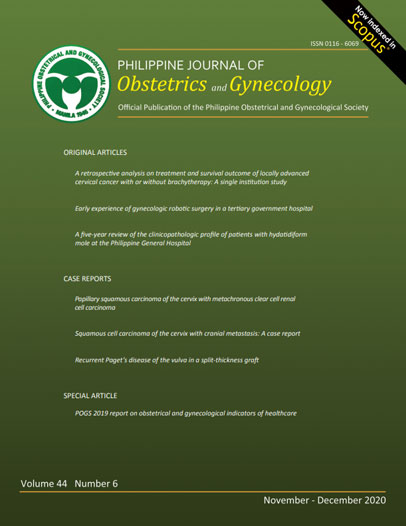Search for articles
Article Detail
Knowledge, attitude and practices towards menopause and hormone replacement therapy among the employees and ob-gyn patients in a tertiary hospital at Manila, Philippines
Arby Jane Roque-Igualada, MD and Eileen M. Manalo, MD, FPOGS, FPSREI, FPSGE
Section of Reproductive Endocrinology and Infertility, Department of Obstetrics and Gynecology, Philippine General Hospital, University of the Philippines-Manila
Objective: To explore the knowledge, attitude and practices of Filipino women towards menopause and hormone replacement therapy
Methods: A clinical descriptive cross-sectional study was conducted from May to November 2018 among a random 250 employees and patients from Philippine General Hospital. Respondents were asked to answer a validated questionnaire regarding their knowledge, attitude and practices towards menopause and hormone replacement therapy (HRT).
Results: The average age of menopause is 48 years old. The top most common symptoms perceived were easy fatigability, mood swings, hot flushes, loss of capacity in engaging in sexual activities, and loss of sexual desire. Half of them (53%) have fair self-rating knowledge on menopause, only 30% have knowledge on HRT and more than half (131=52%) of them have no knowledge at all about HRT. Forty percent answered that they learned it from their doctors. Among the menopause patients, only 9 have taken HRT, and mostly given by a specialist in a public hospital. At least 7 in ten respondents had correct knowledge on menopause but only 14-33% had correct answer on HRT. Almost 70% of the respondents were “undecided” with the statements regarding their perception on HRT, which is consistent with the fact that they don’t even know what HRT means. When asked on practices on menopause, 81% agreed that consulting a doctor for menopause is necessary, and 78% agreed that if HRT was prescribed, they would comply with it. However, only 60% had actually seen a doctor for menopausal symptoms. Only less than half of the respondents would use HRT even if it would cause them relief of symptoms and good health outcome. This is also consistent with the fact that they are not familiar with HRT and the benefits they would get from it.
Conclusion: Majority of women have fair knowledge on menopause but almost none on HRT. Women are not familiar with the benefits they would get from HRT, but there’s a high percentage of women (78%) who will take HRT if prescribed by their doctors. There is a need to strengthen menopausal programs in the country to be able to fill in the gap towards knowledge on menopause and especially HRT.
Current Issue
Search article

